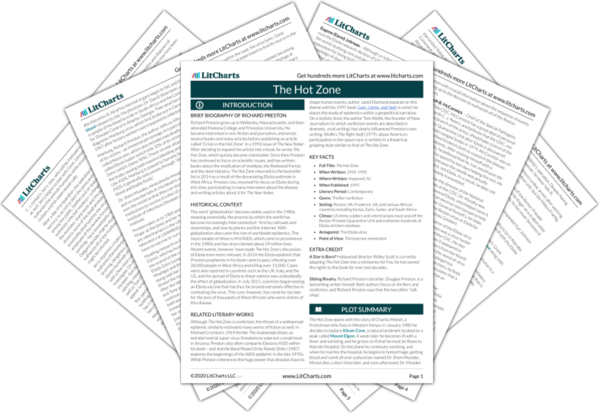In The Hot Zone, Richard Preston chronicles the incredible medical and technological advances of the 20th and 21st centuries. Yet he also makes clear that human curiosity and advancement can go too far, and can in fact end up aiding destructive diseases such as Ebola. While human innovation is useful and life-saving, human hubris—excessive self-confidence, in this case involving innovation and curiosity—can be destructive and deadly. The Reston Primate Quarantine Unit provides a perfect example of the double-edged sword of human innovation. The monkeys in that facility are imported so that scientists can use the primates for research, yet in the events Preston describes the monkeys actually pose incredible danger to humans, whom they could easily have infected with the Ebola that they carry. Countless examples of curiosity that verges on hubris run through the book, such as when USAMRIID scientists sniff a vial of Ebola and potentially infect themselves. At the end of the narrative, Preston himself becomes an emblem of both human curiosity and human hubris. He decides to enter Kitum Cave, which he knows is infected with Ebola, in order to see it for himself. Although he emerges unscathed, he acknowledges how foolish the decision was, and how fearful he was of being infected.
Innovation and Curiosity vs. Hubris ThemeTracker

Innovation and Curiosity vs. Hubris Quotes in The Hot Zone
They were two human primates carrying another primate. One was the master of the earth, or at least believed himself to be, and the other was a nimble dweller in trees, a cousin of the master of the earth. Both species, the human and the monkey, were in the presence of another life form, which was older and more powerful than either of them, and was a dweller in blood.
[Nancy] had almost caught Ebola from a dead monkey, who had caught it from a young woman named Mayinga, who had caught it from a nun who had caught it from a nun who had crashed and bled out in the jungles of Zaire in years gone by.
Gene felt a prickling sensation on his scalp. The paths of Charles Monet and Peter Cardinal had crossed at only one place on earth, and that was inside Kitum Cave. What had they done in the cave? What had they found in there? What had they touched? What had they breathed? What lived in Kitum Cave?
[Peter Jahrling] had held in his gloved hands virtually every hot agent known, except for Ebola and Marburg. When people asked him why he didn’t work with those viruses, he replied, “I don’t particularly feel like dying.”
A freezer can be as hot as hell. When a place is biologically hot, no sensors, no alarms, no instruments can tell the story. All instruments are silent and register nothing.
Be exquisitely careful. Know where your hands and body are at all times. If you get blood on your suit, stop what you are doing and clean it off right away. Don’t let blood stay on your gloves. Rinse them off right away. With bloody gloves, you can’t see a hole in the glove.
The paving of Kinshasa Highway affected every person on earth, and turned out to be one of the most important events of the twentieth century. It has already cost at least ten million lives, with the likelihood that the ultimate number of human casualties will vastly exceed the deaths in the Second World War. In effect, I had witnessed a crucial event in the emergence of AIDS, the transformation of a thread of dirt into a ribbon of tar.
Say “Ahh,” Kitum Cave. Do you have a virus? No instruments, no senses can tell you if you are in the presence of the predator. I turned off my lights and stood in total darkness, feeling a bath of sweat trickle down my chest, hearing the thump of my heart and the swish of blood in my head.
The emergence of AIDS, Ebola, and any number of other rain-forest agents appears to be a natural consequence of the ruin of the tropical biosphere. The emerging viruses are surfacing from ecologically damaged parts of the earth…In a sense, the earth is mounting an immune response against the human species…Perhaps the biosphere does not “like” the idea of five million humans…Nature has interesting ways of balancing itself. The rain forest has its own defenses. The earth’s immune system, so to speak, has recognized the presence of the human species and is starting to kick in. The earth is attempting to rid itself of an infection by the human parasite. Perhaps AIDS is the first step in a natural process of clearance.
I suspect that AIDS might not be Nature’s preeminent display of power. Whether the human race can actually maintain a population of five billion or more without a crash with a hot virus remains an open question. Unanswered. The answer lies hidden in the labyrinth of tropical ecosystems. AIDS is the revenge of the rain forest. It may only be the beginning.
Life had reestablished itself in the monkey house. Ebola had risen in these rooms, flashed its colors, fed, and subsided into the forest. It will be back.











